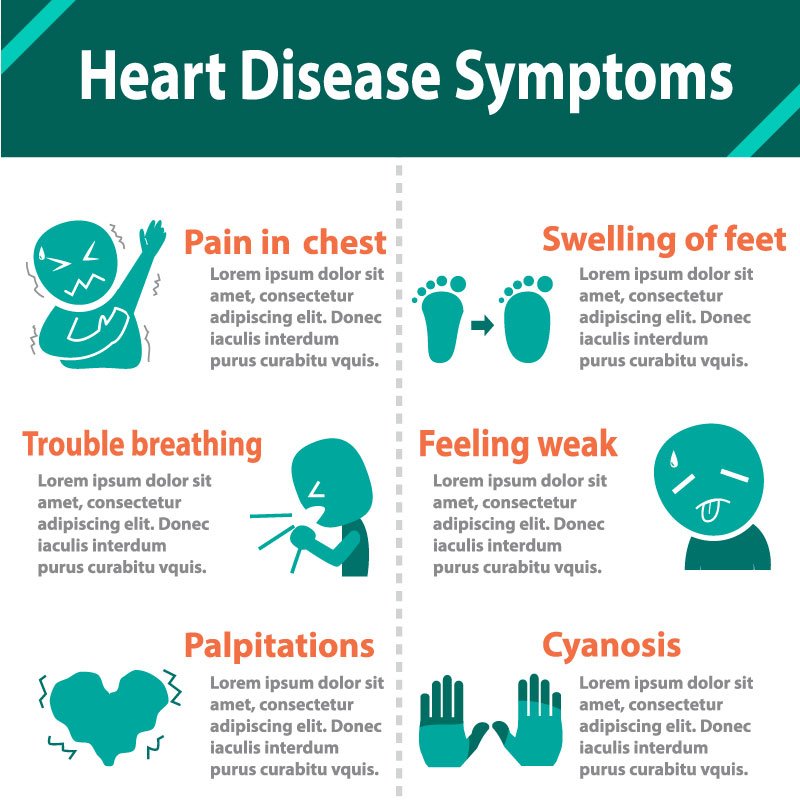Some Disease Conditions and Their Primary Signs and Symptoms
Introduction: Diseases can affect our overall well-being and significantly impact our quality of life. Recognizing the signs and symptoms of various disease conditions is crucial for early detection and timely treatment. In this article, we will explore several common diseases and delve into their primary signs and symptoms.

Cardiovascular Diseases
Cardiovascular diseases encompass a range of conditions affecting the heart and blood vessels. The primary signs and symptoms include:
– Chest pain or discomfort
– Shortness of breath
– Irregular heartbeat
– Fatigue and weakness
– Dizziness or lightheadedness
Respiratory Diseases
Respiratory diseases affect the lungs and the respiratory system. Some common signs and symptoms include:
– Coughing (with or without mucus)
– Shortness of breath
– Wheezing
– Chest tightness or pain
– Frequent respiratory infections
Neurological Disorders
Neurological disorders impact the nervous system, causing various symptoms. The primary signs and symptoms may include:
– Headaches or migraines
– Numbness or tingling sensation
– Muscle weakness or paralysis
– Seizures or convulsions
– Memory loss or cognitive decline
Gastrointestinal Conditions
Gastrointestinal conditions affect the digestive system, leading to digestive issues. The primary signs and symptoms include:
– Abdominal pain or cramps
– Nausea or vomiting
– Diarrhea or constipation
– Bloating or gas
– Rectal bleeding or bloody stool
Endocrine Disorders
Endocrine disorders disrupt the hormonal balance in the body. Some common signs and symptoms include:
– Fatigue or weakness
– Weight gain or loss
– Excessive thirst or hunger
– Changes in appetite
– Mood swings or irritability
Autoimmune Diseases
Autoimmune diseases occur when the immune system attacks healthy cells in the body. The primary signs and symptoms may include:
– Joint pain or swelling
– Fatigue and malaise
– Skin rashes or lesions
– Hair loss or thinning
– Recurrent fever or infections
Conclusion
Recognizing the signs and symptoms of various disease conditions is crucial for early intervention and effective treatment. If you experience any persistent or concerning symptoms, it is advisable to consult with a healthcare professional for a proper diagnosis and appropriate management.
FAQs
1. Q: Can stress cause physical symptoms similar to diseases?
A: Yes, stress can manifest physical symptoms such as headaches, muscle tension, and digestive issues that resemble disease conditions.
2. Q: Are all autoimmune diseases chronic?
A: No, while many autoimmune diseases are chronic, some can have episodic or acute presentations.
3. Q: What should I do if I suspect I have a cardiovascular disease?
A: If you experience symptoms like chest pain, shortness of breath, or irregular heartbeat, seek immediate medical attention.
Q: Can gastrointestinal conditions be managed through diet?
A: In some cases, dietary modifications can help alleviate gastrointestinal symptoms, but it is important to consult with a healthcare professional for personalized advice.
Q: Can neurological disorders be hereditary?
A: Some neurological disorders have a genetic component, making them more likely to occur in individuals with a family history of the condition.
Get Access Now
To stay informed about various diseases, their symptoms, and ways to maintain good health. In this article, we have explored several disease conditions and their primary signs and symptoms. Remember, early detection and prompt medical attention are key to effectively managing these conditions and maintaining overall well-being. Stay vigilant, listen to your body, and prioritize your health.
Brian and Heart Diseases
Introduction: Brian, a 45-year-old man, leads a busy life juggling his career and family responsibilities. Lately, he has been experiencing certain symptoms that are causing concern. Brian’s doctor suspects that he may be at risk of developing heart diseases. In this article, we will explore Brian’s situation and discuss heart diseases, their primary signs, and symptoms.
Brian’s Story
Brian has been noticing symptoms such as chest pain, shortness of breath, and occasional dizziness during physical exertion. These symptoms have been affecting his daily life and causing him to worry. Upon visiting his doctor, Brian undergoes a thorough examination, including medical history review, physical examination, and diagnostic tests.
Understanding Heart Diseases
Heart diseases, also known as cardiovascular diseases, encompass a range of conditions that affect the heart and blood vessels. These conditions can include coronary artery disease, heart failure, arrhythmias, and heart valve problems. Heart diseases are a leading cause of death globally, and it’s crucial to be aware of their signs and symptoms.
Primary Signs and Symptoms
The primary signs and symptoms of heart diseases can vary depending on the specific condition. However, some common indicators include:
– Chest pain or discomfort (angina)
– Shortness of breath or difficulty breathing
– Fatigue and weakness
– Rapid or irregular heartbeat
– Dizziness or lightheadedness
– Swelling in the legs, ankles, or abdomen
Risk Factors
Certain factors can increase an individual’s risk of developing heart diseases. These include:
– High blood pressure
– High cholesterol levels
– Smoking or tobacco use
– Obesity or overweight
– Physical inactivity
– Diabetes
– Family history of heart diseases
– Age (risk increases with age)
Prevention and Management
Preventing heart diseases and managing their risk factors is essential for maintaining heart health. Here are some key steps Brian and individuals can take:
– Adopt a heart-healthy diet rich in fruits, vegetables, whole grains, and lean proteins.
– Engage in regular physical activity, aiming for at least 150 minutes of moderate-intensity exercise per week.
– Avoid smoking and limit alcohol consumption.
– Maintain a healthy weight through a balanced diet and regular exercise.
– Manage stress levels through relaxation techniques, such as meditation or yoga.
– Monitor and control blood pressure, cholesterol, and blood sugar levels.
– Follow prescribed medications and treatment plans as advised by healthcare professionals.
Conclusion
Brian’s situation highlights the importance of recognizing the signs and symptoms of heart diseases. Early detection, proper diagnosis, and timely treatment can significantly improve outcomes. If you or someone you know experiences symptoms similar to Brian’s, it is crucial to seek medical attention promptly.
FAQs
1. Q: Can heart diseases be prevented?
A: While certain risk factors cannot be changed, adopting a healthy lifestyle and managing existing risk factors can significantly reduce the chances of developing heart diseases.
2. Q: Are all chest pains indicative of heart diseases?
A: Not all chest pains are related to heart diseases. However, any persistent or severe chest pain should be evaluated by a healthcare professional to rule out any underlying heart conditions.
3. Q: Can heart diseases be genetic?
A: Yes, certain heart diseases can have a genetic component, making individuals with a family history more susceptible. Regular check-ups and adopting a healthy lifestyle can help mitigate these risks.
4. Q: Can heart diseases affect young individuals?
A: While heart diseases are more common in older adults, they can also affect younger individuals, especially if they have underlying risk factors or a family history of heart diseases.
5. Q: What role does exercise play in preventing heart diseases?
A: Regular exercise helps strengthen the heart and improves overall cardiovascular health. It can reduce the risk of developing heart diseases by promoting healthy blood pressure, cholesterol levels, and weight management.
Get Access Now
To learn more about heart diseases, their prevention, and maintaining a healthy heart, In this article, we have discussed Brian’s situation and provided insights into heart diseases, their signs, and symptoms. Remember, maintaining heart health is crucial for overall well-being, and early intervention is key to managing potential risks. Stay informed, prioritize your heart health, and consult with healthcare professionals for personalized advice and guidance.
https://www.mayoclinic.org/diseases-conditions/infectious-diseases/symptoms-causes/syc-20351173
